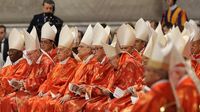On May 7, 2025, a historic conclave commenced in the Vatican as 133 cardinals gathered in the Sistine Chapel to elect a new pope following the death of Pope Francis. This conclave, the largest in the history of the Catholic Church, is set against a backdrop of significant challenges facing the Church, including issues of unity, the fallout from abuse scandals, and the role of women within the institution.
Pope Francis, who passed away last month after a transformative 12-year papacy, led a Church of over 1.4 billion Catholics worldwide. His legacy is a complex one, marked by efforts to modernize the Church and address its most pressing issues. As the cardinals entered the chapel, they were reminded of the weight of their task: to choose a successor who can navigate these turbulent waters.
The conclave began with a solemn Mass at St. Peter’s Basilica, where Cardinal Giovanni Battista Re, the dean of the College of Cardinals, emphasized the importance of unity among the electors. “This is also a strong call to maintain the unity of the Church... a unity that does not mean uniformity, but a firm and profound communion in diversity,” he stated, urging the cardinals to set aside personal considerations in favor of the greater good.
As the cardinals proceeded into the Sistine Chapel, they were reminded of the significance of their decision. The new pope will not only lead the Catholic Church but will also have to tackle pressing issues such as declining church attendance in the West, the ongoing clerical abuse crisis, and the need for financial reform within the Vatican. The next pontiff will need to secure at least 89 votes, a two-thirds majority, to be elected.
Among the cardinals present, there is no clear frontrunner. The group represents a blend of progressive and conservative traditions within the Church, reflecting a spectrum of views on how best to lead the Church into the future. Some cardinals may favor a leader who can build on Francis's legacy, while others may seek a more traditionalist approach.
In a poignant reminder of the Church's ongoing struggles, women’s rights activists gathered outside the Vatican to protest their exclusion from the conclave. “We are saying to the cardinals, you cannot keep ignoring 50% of the Catholic population,” said Miriam Duignan of the Wijngaards Institute for Catholic Research. The protests highlighted a growing demand for the Church to address gender equality and the role of women in its leadership.
As the cardinals prepare to vote, they have surrendered their mobile phones and sworn an oath of secrecy, pledging to keep the conclave’s deliberations confidential. The voting process is steeped in tradition; the cardinals will cast their ballots in secret, and the results will be communicated through smoke signals from the chimney of the Sistine Chapel. Black smoke will indicate an inconclusive vote, while white smoke will announce the election of a new pope.
Voting is expected to last several days, as no pope has been elected on the first day of a conclave for centuries. The cardinals may hold up to four voting sessions each day, beginning the day after the Mass. The anticipation among the faithful is palpable, with many gathered in St. Peter’s Square, awaiting news of the first vote.
One visitor expressed awe at being present during such a significant moment in history, stating, “It’s amazing. I think it’s really amazing. We are very fortunate to be in Rome at this time.” Another visitor shared a sense of hope for the future of the Church, saying, “I have great hope because I think Pope Francis gave us an incredible legacy to follow.”
As the cardinals enter this pivotal moment, they carry with them the hopes and prayers of millions of Catholics around the world. The decision they make will not only shape the future of the Church but will also resonate through society at large, addressing issues of justice, compassion, and the Church’s role in a rapidly changing world.
The conclave is a reminder of the enduring nature of the Catholic Church and its capacity for renewal and reform. As the cardinals deliberate, they are called to invoke the guidance of the Holy Spirit, seeking wisdom and clarity in their choice of the 267th pope. The eyes of the world are upon them as they embark on this sacred journey.

